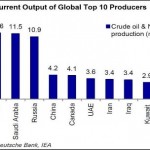Kenyatta Sees Kenya Windfall Tax in Resource Laws in Months

Kenya will impose capital-gains and windfall taxes on oil, gas and mining companies within months to ensure the East African nation maximizes benefits from its mineral resources, President Uhuru Kenyatta said.
“This is something that we are very clear about,” Kenyatta said in an Aug. 2 interview at State House in the capital, Nairobi. “We want to ensure that we as a country also are able to benefit from both the windfall and capital-gains tax.”
Tullow Oil Plc (TLW) and partner Africa Oil Corp. (AOI) have found oil reserves in northern Kenya, while BG Group Plc (BG/) is exploring for gas and Randgold Resources Ltd. (RRS) is studying the nation’s potential for gold production. Kenya wants to avoid a similar situation to Tullow’s experience in Uganda, where the company is contesting in court the state revenue authority’s demand that it pay capital-gains tax of about $473 million following its sale of assets in Uganda. The explorer has paid 30 percent of the amount, it said on July 30.
“Uganda has lost a lot of revenue as a result of not really having focused on that,” Kenyatta said. “We want something that’s fair, but equally recognizing that Kenya as a country must benefit from this.”
Kenyatta’s administration is preparing legislation for the extractive industry as investors demand to expand operations in a more predictable environment. Mines Secretary Najib Balala last year canceled 43 mining and exploration licenses held by companies including Base Resources Ltd. (BSE)’s Base Titanium unit, after discovering possible irregularities in the granting of permits.
Before Parliament
In “a couple of months we should have all these laws firmly in place as well as the regulations that will guide the operations of oil and gas as well as mining,” Kenyatta said. The mining law is already before parliament, while the oil bill will be submitted shortly, he said.
Enacting the laws this year will be a positive signal to investors that Kenya is keen on creating necessary conditions for the industry, Ahmed Salim, a senior associate at Teneo Intelligence, said in an e-mailed response to questions.
“The state of Kenya’s regulatory framework on energy policy and petroleum legislation is one of confusion and in drafting and implementing the laws there will have to be substantial coordination within the government,” he said. “It will also be important to see what measures will be in the legislation that will protect companies in case the government chooses to unilaterally revoke licenses, similar to what happened last year.”
Kenya Rankings
The nation ranks third globally in production of soda ash, used in the manufacture of glass, and seventh in output of fluorspar, used in steel, according to the U.S. Geological Survey. The government said last December it plans to offer 31 coal blocks for exploration. While the country has deposits of gold, rubies and sapphires, mining represents less than 1 percent of its gross domestic product, according to the African Development Bank.
Kenya may begin producing crude by the end of the decade, Kenyatta said. Tullow said in August it was looking to start pumping oil as early as this year.
“We are talking about a five- to six-year cycle before we get the first oil,” Kenyatta said.
Fingers Crossed
Kenya, the last frontier in East Africa’s hydrocarbons resource-search after oil finds in Uganda and natural gas in Tanzania, has its “fingers crossed” before gas discoveries in the northern part of the country are quantified “soon,” according to Kenyatta.
The president said he wants to ensure the laws also provide for benefits to national as well as county governments, and communities where the resources are located.
“We are looking at the legal framework and revenue sharing that will ensure these resources are shared in the most equitable fashion, while at the same time recognizing that the investors who we are partnering with also need their return,” he said.
The government is now seeking ways of using its coal, and gas if viable finds are made, to produce the electricity needed to expand its industries, as it builds infrastructure to ultimately export the resources, according to Kenyatta.
Growth Rate
Kenya, East Africa’s biggest economy, will probably grow at 5 percent this year, the World Bank said in its Global Economic Prospects document on June 11. The lender reduced the prediction to 4.7 percent for 2014 as delayed seasonal rains have curbed agricultural production and worsening insecurity has scared off tourists, it said on June 26.
Kenyatta, who become president after last year’s general elections in March, said he is confident Kenya can still achieve an economic growth rate of 10 percent by 2017.
The first year has been a “roller-coaster year,” where his administration began to implement a new constitution, establish new institutions of government, and improve efficiency in land and company registry, he said. Kenya will see economic growth at the desirable levels once institutions and investments in infrastructure start to pay dividends, according to Kenyatta.
Fitch Ratings affirmed the country’s credit assessment at B+, the fourth-highest non-investment grade, with a stable outlook on July 25.
Kenya sold its first Eurobond in June, with yields on the $1.5 billion of debt maturing in 10 years falling 64 basis points since they were issued to 6.23 percent on Aug. 1.
Source: bloomberg





























